Related Research Articles

Heraclitus was an ancient Greek pre-Socratic philosopher from the city of Ephesus, which was then part of the Persian Empire.
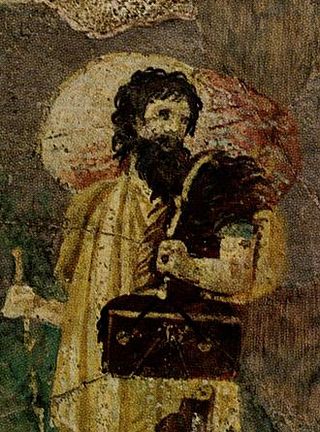
Crates of Thebes was a Greek Cynic philosopher, the principal pupil of Diogenes of Sinope and the husband of Hipparchia of Maroneia who lived in the same manner as him. Crates gave away his money to live a life of poverty on the streets of Athens. Respected by the people of Athens, he is remembered for being the teacher of Zeno of Citium, the founder of Stoicism. Various fragments of Crates' teachings survive, including his description of the ideal Cynic state.
Diogenes Laërtius was a biographer of the Greek philosophers. Nothing is definitively known about his life, but his surviving Lives and Opinions of Eminent Philosophers is a principal source for the history of ancient Greek philosophy. His reputation is controversial among scholars because he often repeats information from his sources without critically evaluating it. He also frequently focuses on trivial or insignificant details of his subjects' lives while ignoring important details of their philosophical teachings and he sometimes fails to distinguish between earlier and later teachings of specific philosophical schools. However, unlike many other ancient secondary sources, Diogenes Laërtius generally reports philosophical teachings without attempting to reinterpret or expand on them, which means his accounts are often closer to the primary sources. Due to the loss of so many of the primary sources on which Diogenes relied, his work has become the foremost surviving source on the history of Greek philosophy.
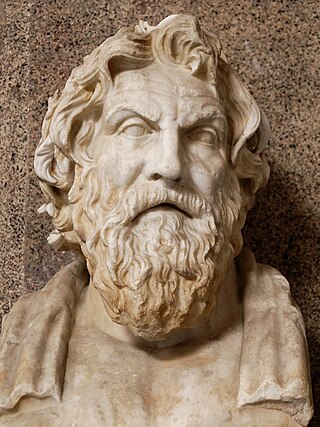
Antisthenes was a Greek philosopher and a pupil of Socrates. Antisthenes first learned rhetoric under Gorgias before becoming an ardent disciple of Socrates. He adopted and developed the ethical side of Socrates's teachings, advocating an ascetic life lived in accordance with virtue. Later writers regarded him as the founder of Cynic philosophy.
Diogenes of Apollonia was an ancient Greek philosopher, and was a native of the Milesian colony Apollonia in Thrace. He lived for some time in Athens. He believed air to be the one source of all being from which all other substances were derived, and, as a primal force, to be both divine and intelligent. He also wrote a description of the organization of blood vessels in the human body. His ideas were parodied by the dramatist Aristophanes, and may have influenced the Orphic philosophical commentary preserved in the Derveni papyrus. His philosophical work has not survived in a complete form, and his doctrines are known chiefly from lengthy quotations of his work by Simplicius, as well as a few summaries in the works of Aristotle, Theophrastus, and Aetius.

Diogenes, also known as Diogenes the Cynic or Diogenes of Sinope, was a Greek philosopher and one of the founders of Cynicism. He was born in Sinope, an Ionian colony on the Black Sea coast of Anatolia in 412 or 404 BC and died at Corinth in 323 BC.

Menippus of Gadara was a Cynic satirist. The Menippean satire genre is named after him. His works, all of which are lost, were an important influence on Varro and Lucian, who ranks Menippus with Antisthenes, Diogenes, and Crates as among the most notable of the Cynics.
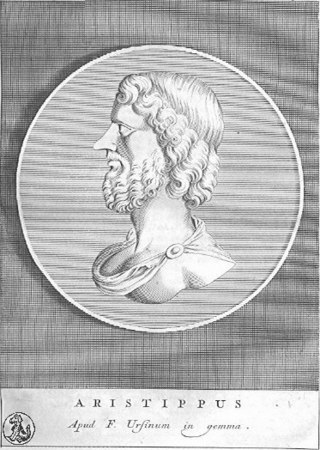
The Cyrenaics or Kyrenaics, were a sensual hedonist Greek school of philosophy founded in the 4th century BCE, supposedly by Aristippus of Cyrene, although many of the principles of the school are believed to have been formalized by his grandson of the same name, Aristippus the Younger. The school was so called after Cyrene, the birthplace of Aristippus. It was one of the earliest Socratic schools. The Cyrenaics taught that the only intrinsic good is pleasure, which meant not just the absence of pain, but positively enjoyable sensations. Of these, momentary pleasures, especially physical ones, are stronger than those of anticipation or memory. They did, however, recognize the value of social obligation and that pleasure could be gained from altruistic behaviour. The school died out within a century and was replaced by the philosophy of Epicureanism.
Metrocles was a Cynic philosopher from Maroneia. He studied in Aristotle’s Lyceum under Theophrastus, and eventually became a follower of Crates of Thebes, who married Metrocles’ sister Hipparchia. Very little survives of his writings, but he is important as one of the first Cynics to adopt the practice of writing moral anecdotes (chreiai) about Diogenes and other Cynics.
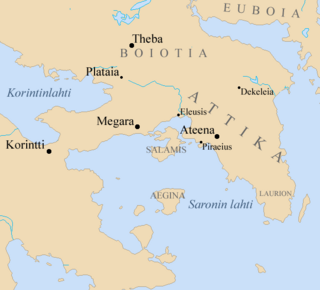
The Megarian school of philosophy, which flourished in the 4th century BC, was founded by Euclides of Megara, one of the pupils of Socrates. Its ethical teachings were derived from Socrates, recognizing a single good, which was apparently combined with the Eleatic doctrine of Unity. Some of Euclides' successors developed logic to such an extent that they became a separate school, known as the Dialectical school. Their work on modal logic, logical conditionals, and propositional logic played an important role in the development of logic in antiquity.

Onesicritus, a Greek historical writer and Cynic philosopher, who accompanied Alexander the Great on his campaigns in Asia. He claimed to have been the commander of Alexander's fleet but was actually only a helmsman; Arrian and Nearchus often criticize him for this. When he returned home, he wrote a history of Alexander's campaigns. He is frequently cited by later authors, who also criticize him for his inaccuracies.
Simon the Shoemaker was an associate of Socrates, and a 'working-philosopher'. He is known mostly from the account given in Diogenes Laërtius' Lives and Opinions of Eminent Philosophers. He is also mentioned in passing by Plutarch and Synesius; a pupil of Socrates, Phaedo of Elis, is known to have written a dialogue called Simon.
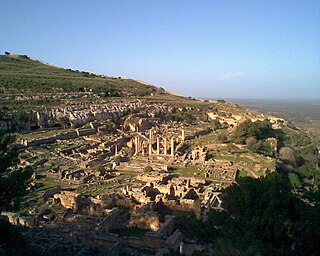
Hegesias of Cyrene was a Cyrenaic philosopher. He argued that eudaimonia (happiness) is impossible to achieve, and that the goal of life should be the avoidance of pain and sorrow. Conventional values such as wealth, poverty, freedom, and slavery are all indifferent and produce no more pleasure than pain. Cicero claims that Hegesias wrote a book called ἀποκαρτερῶν, which persuaded so many people that death is more desirable than life that Hegesias was banned from teaching in Alexandria. It has been thought by some that Hegesias was influenced by Buddhist teachings.
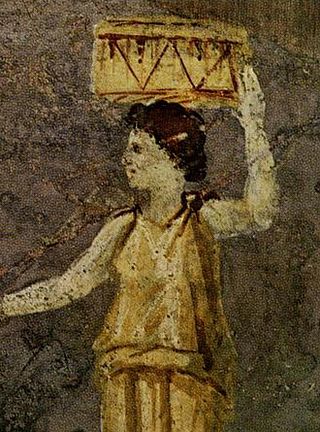
Hipparchia of Maroneia was a Cynic philosopher, and wife of Crates of Thebes. She was the sister of Metrokles, the cynic philosopher. She was born in Maroneia, but her family moved to Athens, where Hipparchia came into contact with Crates, the most famous Cynic philosopher in Greece at that time. She fell in love with him, and, despite the disapproval of her parents, she married him. She went on to live a life of Cynic poverty on the streets of Athens with her husband.
Apollodorus of Seleucia, or Apollodorus Ephillus, was a Stoic philosopher, and a pupil of Diogenes of Babylon.
This page is a list of topics in ancient philosophy.
Bryson of Achaea was an ancient Greek philosopher.

Cynicism is a school of thought of ancient Greek philosophy as practiced by the Cynics. For the Cynics, the purpose of life is to live in virtue, in agreement with nature. As reasoning creatures, people can gain happiness by rigorous training and by living in a way which is natural for themselves, rejecting all conventional desires for wealth, power, and fame, and even flouting conventions openly and derisively in public. Instead, they were to lead a simple life free from all possessions.
Theombrotus was an ancient Greek philosopher of the Cynic school who is said to have thrown himself to his death from a high wall after reading Plato's work on the immortality of the soul and concluding that he would be better off in the next life.
Diogenes or On Virtue is a speech delivered by Dio Chrysostom between AD 82 and 96, which is presented as a speech delivered by the Cynic philosopher Diogenes of Sinope at the Isthmian Games. It presents the superiority of a Cynic lifestyle, through a comparison with the professional athlete and a revisionist account of the life of Heracles. The oration forms a pair with the Isthmian Oration, which continues the story of Diogenes' visit to the Isthmian Games with many of the same themes.
References
- ↑ Curnow, Trevor (2006-06-22). The Philosophers of the Ancient World: An A-Z Guide. A&C Black. ISBN 9780715634974 . Retrieved 2018-07-08.
- ↑ "Diogenes Laertius, Lives of Eminent Philosophers,BOOK VI, Chapter 2. DIOGENES (404-323B.C.)". www.perseus.tufts.edu. Retrieved 2018-07-08.
- ↑ Diogenes; Cynic, Diogenes the (2012-05-10). Sayings and Anecdotes: With Other Popular Moralists. OUP Oxford. ISBN 9780199589241 . Retrieved 2018-07-08.